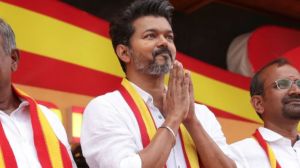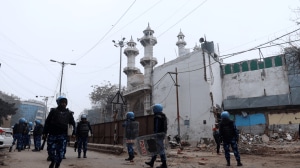Christians well protected, PM assures Pope
ROME, JUNE 26: Under pressure because of the recent string of attacks against Christians across the country, Prime Minister Atal Behari Va...

ROME, JUNE 26: Under pressure because of the recent string of attacks against Christians across the country, Prime Minister Atal Behari Vajpayee today told Pope John Paul II at the Vatican that New Delhi had taken 8220;every possible step8221; to prevent these attacks.
Vajpayee spent 15 minutes at the Vatican with his Principal Secretary Brajesh Mishra, son-in-law Ranjan Bhattacharya, daughter and granddaughter and the Finance Minister. His one-on-one meeting with the Pope lasted less than 10 minutes.
An official statement issued after the meeting said the government was deeply concerned about the attacks which had taken place on Christians and their institutions.
The Prime Minister said it was necessary to see the whole issue in its correct perspective in order to appreciate its magnitude and implications. Implicit in this statement is the fact that the Pope8217;s viewpoint differs widely from that of India.
He explained to the Pope that though crime was the responsibility of the state governments, the Central Government had taken prompt measures to safeguard the interest of the minority communities and instil a sense of confidence among them. 8220;We are firm in our determination to deal with perpetrators of violence and are taking all necessary measures to ensure an atmosphere of communal harmony. The Central Government is in close touch with the state governments for ensuring that all preventive and precautionary measures are taken for the maintenance of peace and communal harmony. The Government is resolved that perpetrators of violence should be dealt with firmly and that exemplary punishment should be awarded to them,8221; an official statement issued after the meeting said.
On the economy, Vajpayee said the second phase of reforms would go on in the areas of foreign exchange and allowing competition to grow.
In remarks to the Italian Prime Minister, Vajpayee said that India had not blindly embraced globalisation and would continue to be sensitive to the human consequences of privatization.
8220;The transition from a socialist model of growth to an economy governed primarily by market forces has to be calibrated with care and caution,8221; he said, promising that the social sector would not be neglected in India8217;s commitment to restructuring. 8220;Apart from the changes in the industrial structure, the next few years will see India placing importance on bringing about changes in the agriculture and social sector.8221;
Vajpayee8217;s statement assumes significance in the context of the recent reservations voiced by some ministers about the process of disinvestment.
He said that since India began its economic reforms programme, the economy had achieved GDP growth at over 6 per cent and its target was 7 per cent growth next year. Significant relaxation in FDI investment rules had been announced to enable Indian industry to meet the challenge of globalisation, and there was scope for investment in India both in the New and Old economy.
8220;We are focusing attention on areas like rural connectivity, drinking water, education, rural sanitation and primary health. These are also areas where private initiative has an important role to play8221; he said.
On bilateral ties with Italy, Vajpayee said a two-way trade of 2 billion did not represent the potential that was possible. Total approvals for Italian investment to India had been 1.3 billion while realization was significantly lower. This had to be enhanced, he said.
- 01
- 02
- 03
- 04
- 05































